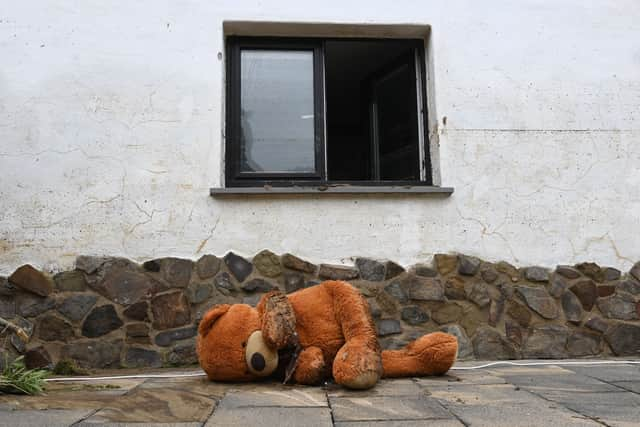Over 120,000 children in the UK are living in destitution, a charity survey suggests
and live on Freeview channel 276
A charity survey reveals 120,000 children in the UK are living in the most extreme form of poverty.
An increase in the levels of destitution has been described as “stark and worrying” by Buttle UK. The charity, which works with children and young people in crisis, suggested the situation has worsened since last year.
Advertisement
Hide AdAdvertisement
Hide AdIts survey of 1,240 frontline professionals across England, Scotland, Northern Ireland and Wales found that some 60% of the children they work with were living in destitution – up from 45% reported the previous year and 36% in 2021.


The charity, which published its annual State of Child Poverty report on Friday, stated: “By extension, the families our frontline workers are supporting includes approximately 122,000 children living in destitution.
“The year-on-year change between the last three survey cohorts dramatically illustrates the progressively worsening circumstances for children in poverty.”
The charity described the term destitution as one of the absolute lowest standard of living any adult, child or young person can experience, adding that the “lived reality is degrading and unsustainable”.
Advertisement
Hide AdAdvertisement
Hide AdThe charity report said someone is considered destitute if they have gone without at least two of the following in the past month – shelter, food, lighting, heating, clothing, basic toiletries.
Buttle’s chief executive, Joseph Howes, said the report “demonstrates the catastrophic impact of the pandemic and the cost of living crisis”.
In the report, of the families the workers trying to help, more than half reported not being able to afford enough food and nutrition (57%); not being able to afford gas and electricity (58%); going without basic furniture such as beds, sofas and appliances (63%); going without IT equipment for education or employment (65%); and some 49% said they were not able to afford their rent or equivalent.
Some frontline workers reported children going to school hungry, being unable to concentrate or participate in classes, and some refusing to attend “if they are noted to be different, hungry, dirty, smelly, tired”.
Advertisement
Hide AdAdvertisement
Hide AdLast month, Education Secretary Gillian Keegan said pupil absences were at “crisis” level, as she endorsed headteachers driving children to school if necessary.
Figures released earlier this year showed that around 125,000 pupils last year were severely absent, effectively meaning they were absent more often than they were in classrooms.
Buttle has repeated calls made by other organisations for the government to lift the two-child universal credit limit which it said “significantly reduces household income and wellbeing”.
It also backed calls to introduce an “essentials guarantee” so the basic rate of universal credit at least covers the cost of life’s essentials, with support never being pulled below that level. It urged the appointment of a dedicated cabinet minister for children and young people.
Advertisement
Hide AdAdvertisement
Hide AdOf the report’s findings, Mr Howes said: “More and more children are having to go without food, and the situations these challenges are creating are preventing them from having any chance to reach their potential at school. The increase in children and young people living in destitution is stark and worrying.
“A child poverty strategy is needed to support in the longer term, but changes can be made now to pull hundreds of thousands of children out from the destructive grip of poverty.
“We urge the government to act now and support struggling families by lifting the two-child Universal Credit limit and introducing an Essentials Guarantee, ensuring benefits always cover the basic essentials.”
While there is currently a minister for children, families and wellbeing, the charity said it wants to see a cabinet-level minister “who can provide cross-government co-ordination and leadership for children, including leading on a new Child Poverty Strategy”.
Advertisement
Hide AdAdvertisement
Hide AdA government spokesperson said: “There are 400,000 fewer children in poverty since 2010 – but we know cost-of-living pressures are squeezing families’ budgets, which is why we’re providing record financial support worth an average £3,300 per household and bearing down on inflation to help everyone’s money go further.
“The two-child policy asks families on benefits to make the same financial decisions as families supporting themselves solely through work, and there are careful exemptions.”
Comment Guidelines
National World encourages reader discussion on our stories. User feedback, insights and back-and-forth exchanges add a rich layer of context to reporting. Please review our Community Guidelines before commenting.
